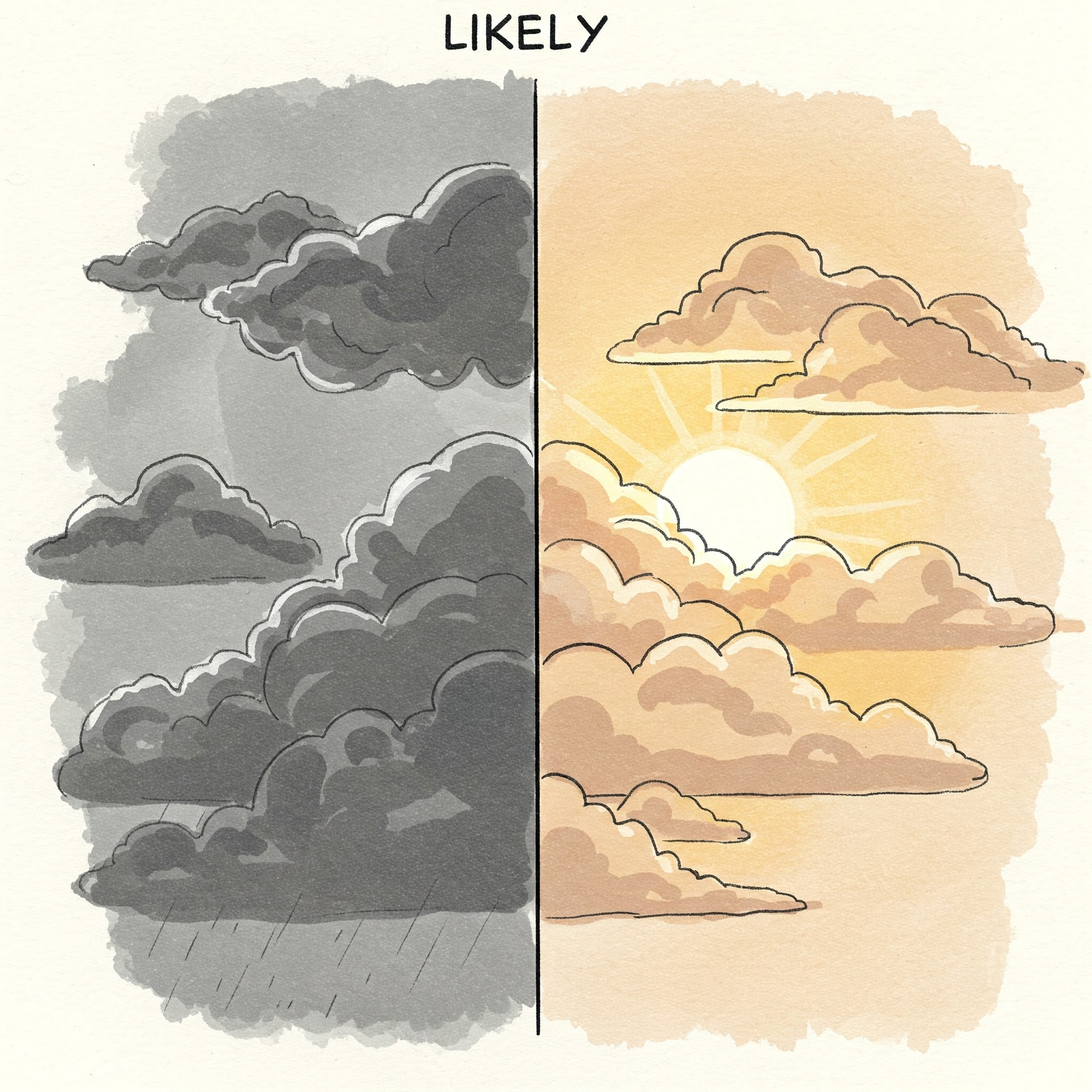Likely
Definition
Likely can function as an adjective and an adverb. As an adjective, it refers to something that is probable or expected to happen. As an adverb, it indicates the likelihood of an event occurring or the manner in which something is expected to take place.
Parts of Speech
- Adjective
- Adverb
Pronunciation
American English
- IPA Pronunciation: /ˈlaɪk.li/
- Respelling: LYKE-lee
British English
- IPA Pronunciation: /ˈlaɪk.li/
- Respelling: LYKE-lee
Etymology
The word "likely" originates from Middle English "likly," meaning "having the appearance of truth," derived from Old Norse "líkligr," meaning "probable or resembling." It is based on the Proto-Germanic root "*līkaz," meaning "similar" or "like."
Derivatives
- Likelihood (noun)
- Unlikely (adjective)
- Likewise (adverb)
- Overlikely (adverb)
- Like (verb/adjective)
Synonyms
- Probable
- Possible
- Expected
Antonyms
- Unlikely
- Improbable
- Unexpected
Usage
The term "likely" is commonly used to express probability or expectation. For example, "It is likely to rain tomorrow." As an adverb, it appears in contexts such as "She will likely attend the meeting."
Related Terms
- Probability: The measure of the likelihood of an event.
- Possibility: A chance of something occurring.
- Certainty: The state of being definite or sure.
Detailed Definitions
Adjective
- Probable or expected to happen: Indicates a high degree of possibility.
- Example: "The team is likely to win the championship."
- Suitable or appropriate: Describes something fitting or proper.
- Example: "He is a likely candidate for the job."
Adverb
- In all probability; probably: Refers to the expected manner or outcome.
- Example: "The weather will likely improve by evening."
likely



🇨🇳 Chinese (Mandarin)
- "可能" (kěnéng) – likely as in probable.
- IPA Pronunciation: /kʰɤ̌.nə̌ŋ/
- English Respell: ke-neng
- "像是" (xiàng shì) – likely as in seems like.
- IPA Pronunciation: /ɕjâŋ ʂɻ̩̂/
- English Respell: xiang shi
🇮🇳 Hindi
- "संभावित" (sambhāvit) – likely as in probable.
- IPA Pronunciation: /səmbʱɑːʋɪt/
- English Respell: samb-ha-vit
- "जैसा" (jaisā) – likely as in seems like.
- IPA Pronunciation: /d͡ʒɛːsɑː/
- English Respell: jai-sa
🇪🇸 Spanish
- "Probable" – likely as in probable.
- IPA Pronunciation: /pɾoˈβaβle/
- English Respell: pro-ba-ble
- "Parecido" – likely as in seems like.
- IPA Pronunciation: /paɾeˈθiðo/ (Spain), /paɾeˈsiðo/ (Latin America)
- English Respell: pare-thi-do (Spain), pare-si-do (Latin America)
🇫🇷 French
- "Probable" – likely as in probable.
- IPA Pronunciation: /pʁɔbabl/
- English Respell: pro-babl
- "Comme" – likely as in seems like.
- IPA Pronunciation: /kɔm/
- English Respell: kom
🇸🇦 Arabic (Modern Standard Arabic)
- "محتمل" (muḥtamal) – likely as in probable.
- IPA Pronunciation: /muħˈtæmæl/
- English Respell: muh-tam-al
- "كأن" (ka'ann) – likely as in seems like.
- IPA Pronunciation: /kaʔann/
- English Respell: ka-ann
🇧🇩 Bengali
- "সম্ভাব্য" (sambhabya) – likely as in probable.
- IPA Pronunciation: /ʃɔmbʱɔbːo/
- English Respell: shom-bho-bo
- "মত" (mata) – likely as in seems like.
- IPA Pronunciation: /moʈ/
- English Respell: mot
🇷🇺 Russian
- "Вероятно" (veroyatno) – likely as in probable.
- IPA Pronunciation: /vʲɪrɐˈjatnə/
- English Respell: vi-ro-yat-na
- "Похоже" (pokhozhe) – likely as in seems like.
- IPA Pronunciation: /pɐˈxoʐɨ/
- English Respell: po-kho-zhe
🇵🇹 Portuguese
- "Provável" – likely as in probable.
- IPA Pronunciation: /pɾuˈvavɛl/
- English Respell: pro-vavel
- "Parece" – likely as in seems like.
- IPA Pronunciation: /pɐˈɾesɨ/
- English Respell: pa-re-se
🇮🇩 Indonesian
- "Mungkin" – likely as in probable.
- IPA Pronunciation: /muŋkin/
- English Respell: mung-kin
- "Seperti" – likely as in seems like.
- IPA Pronunciation: /səˈperti/
- English Respell: se-per-ti
🇩🇪 German
- "Wahrscheinlich" – likely as in probable.
- IPA Pronunciation: /ˈvaːɐ̯ʃaɪ̯nlɪç/
- English Respell: vah-shain-lich
- "Scheint" – likely as in seems like.
- IPA Pronunciation: /ʃaɪ̯nt/
- English Respell: shaint
🇯🇵 Japanese
- "たぶん" (tabun) – likely as in probable.
- IPA Pronunciation: /ta.bɯɴ/
- English Respell: ta-bun
- "~のようだ" (no you da) – likely as in seems like.
- IPA Pronunciation: /no joː da/
- English Respell: no yo da
🇻🇳 Vietnamese
- "Có thể" – likely as in probable.
- IPA Pronunciation: /kɔ˨˩ tʰe˧˥/
- English Respell: co the
- "Giống như" – likely as in seems like.
- IPA Pronunciation: /ziəwŋ˧ˀ˨ʔ ɲɜ˧/
- English Respell: ziong nhu
🇰🇷 Korean
- "아마" (ama) – likely as in probable.
- IPA Pronunciation: /a.ma/
- English Respell: a-ma
- "같다" (gatda) – likely as in seems like.
- IPA Pronunciation: /ɡat̚.ta/
- English Respell: gat-da
🇹🇷 Turkish
- "Muhtemel" – likely as in probable.
- IPA Pronunciation: /muhteˈmel/
- English Respell: muh-te-mel
- "Gibi" – likely as in seems like.
- IPA Pronunciation: /ɟi.bi/
- English Respell: ji-bi
🇵🇰 Urdu
- "ممکنہ" (mumkinah) – likely as in probable.
- IPA Pronunciation: /mʊmˈkɪnə/
- English Respell: mum-ki-na
- "جیسے" (jaise) – likely as in seems like.
- IPA Pronunciation: /d͡ʒeːseː/
- English Respell: jay-se





